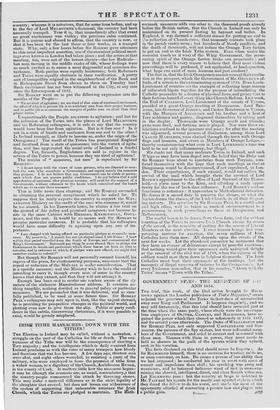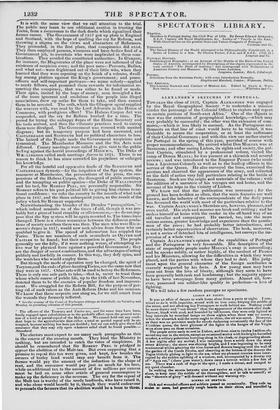GOVERNMENT SPIES: THE MINISTERS OF 1s17
AND 1834.
THE trial, this week, of the libel action brought by RICH- MOND against the London publishers of Tait': Magazine,* weals to [mind the practices of the Tories in their days of uncontrolled sway over King and Parliament. It happens singularl), and we may add fortunately, that this trial should have occurred just at the time when the same party, whose chiefs were the unscrupu- lous employers of OLIVER, CASTLES, and Ricanuorso, have re- gained the power which they abused so infamously in 1816, 1817, and for several years afterwards. The Duke of WELLINGTON and Sir ROBERT PEEL not only supported CASTLEREAGH and SID- MOUTH, the patrons of the Spy system, but were influential mem- bers of the Government, and acted in concert and in council with those men. Sharers with them in power, they must needs be held as sharers in the guilt of the system which they upheld, each in his vocation.
The facts disclosed on this trial should never be forgotte i. As for RICHMOND himself, there is DO occasion for wasting no'ile ire, or even contempt, on him. He seems a person of less ability than we bad supposed : he conducted his case in court with more of conceit and impudence than skill ; his speaking was prosy and wearisome, and he betrayed ludicrous want of tact in cross-exa- mining the shrewd, intelligent, direct, and clear Scotch witne,ses. Let RICHMOND pass : but the country at large is indebted to Mr. TAIT and his agents for the manly and spirited style in u luieh they dared the follow to do his worst, and matie the most of the opportunity afforded of converting a private loss and plague into a public gain.
It is with the same view that we call attention to the trial. The. public may learn to use additional caution in trusting the
Tories, from a recurrence to the dark deeds which signalized their former career. The Government of 1817 got up plots in England and Scotland, with the hope of quelling the cry for Reform, and throwing a stigma on the views and characters of Reformers. They pretended, in the first place, that conspiracies did exist. They then employed psrsons, wiseacres and busy-bodies fond of a Government job, to ascertain who were implicated in these com- binations. They avoided the constituted authorities. In Glasgow, for Instance, the Magistrates of the place were not informed of the existence of suspicion even ; and the poor men—Provosts, Bailies, and what not—were frightened out of their little wits, when they learned that they were reposing on the brink of a volcano, dwell- ing among plotters against the King's government ; and peace- officers and self-important partisans—we name nobody—applied to needy fellows, and promised them rewards for information re- specting the conspiracy, that was either to be found or made. Their spies, incited by the hope of money. soon inveigled a few
of the more ignorant and credulous of the people into illegal associations, drew up oaths for them to take, and then caused them to be arrested. The oath, which the Glasgow agent supplied the weavers with, was read by the Lord Advocate in the House of
Commons, with prodigious effect! The Habeas Corpus Act was suspended, and the cry for Reform hushed for a time. The period for trying the unhappy dupes of the Home Secretary and his tools arrived, and then the villanous practices used to entrap them were divulged. The Government was covered with merited disgrace; but its temporary purpose had been answered, and CASTLEREAGH and SIDMOUTH had no political characters to lose. The hatred of the People made the Government suspicious and
tyrannical. The Manchester Massacre and the Six Acts soon followed. County meetings were called to give vent to the public fecling against the horrid proceedings of Minis'e:s. The Duke of WELLINGTON called such meetings farces in 1821. There, is no reason to think he has since corrected his prejudices or enlarged his knowledge.
For all the hateful and oppieisive deeds of the SIDMOUTH and CASTLEREAGH dynasty—for the iniquities of the Spy system, the massacre at Manchester, the persecutions of the press, the sus- pensions of the Habeas Corpus, the disregard of public meetings, and the trampling on public opinion—the Duke of WELLINGTON and his tool, Sir ROBERT PEEL, are personally responsible. Sir ROBERT refers to his past political life as giving him claims to na- tional confidence : we refer the country to the records of what took place in 1817, and the three subsequent years, as the result of the policy which Sir ROBERT supported.
Notwithstanding the blunder of the Dundee " precognition,"— which indeed reminds us of the times of old, though it was pro-
bably but a piece of local stupidity or officiousness,—we do not sup- pose that the Spy system will be again resorted to. The times have changed. There is a closer connexion between the different grada- tions of society now than there was then. The men who were Ric n- MOND'S dupes in 1817, would now seek advice from those who are qualified to give it. The spread of information has crippled the Tories. There are numbers of such scoundrels as OLIVER and CASTLES to be found; but their occupation is gone. The people generally see the folly, if it were nothing worse, of attempting ac- tive war by physical force against a powerful Government ; they see the danger of secret combinations, and the advantages electing publicly and lawfully in concert. In this way, they defy spies, and the wretches who would employ them. But though the mode of operation may be changed, the spirit of Toryism,and the ends of place-huntingTories, are the same now that they were in 1817. Other arts will be used to betray the Reformers. There is only one safe path to take,—that is, never to trust those whose whole course of public life, up to the 15th of last November, denoted them to be the enemies of popular .freedom and improve- ment. We struggled for the Reform Bill, for the purpose ofget- ting rid of such rulers as the Anti-Reform Duke and his minions. We know that these serpents can sting us, fur we still smart from the wounds they formerly inflicted.
• See the account of the Court of Exchequer sittings at Guildhall. on Saturday and
Monday, in preceding columns of this journal,

















 Previous page
Previous page